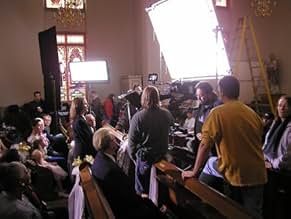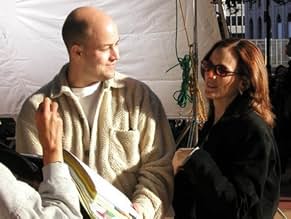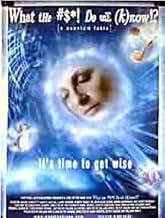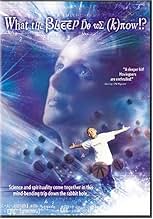AVALIAÇÃO DA IMDb
5,2/10
14 mil
SUA AVALIAÇÃO
Adicionar um enredo no seu idiomaA fictional photographer's quest to spiritually rediscover herself is interspersed with documentary footage of scientists and theologians discussing the philosophical aspects of quantum phys... Ler tudoA fictional photographer's quest to spiritually rediscover herself is interspersed with documentary footage of scientists and theologians discussing the philosophical aspects of quantum physics.A fictional photographer's quest to spiritually rediscover herself is interspersed with documentary footage of scientists and theologians discussing the philosophical aspects of quantum physics.
- Direção
- Roteiristas
- Artistas
- Prêmios
- 2 vitórias no total
James Langston Drake
- Groom
- (as Jame Drake)
Michele Mariana
- Tour Guide
- (as Michelle Mariana)
Avaliações em destaque
The movie got a lot of the quantum theory and neurology right, but then it proceeds to make a lot of wild tangential claims that are loosely based on the theory and pass it off as the absolute truth. Anybody with a advanced physics background (my job requires an advanced math and physics background) will be deeply turned off (despite the fact that a number of physicists and neurologists are interviewed for the film). The scientists back up the scientific theory, but then some new age woman and others (some scientists, but mainly that woman) kept on saying things that were loosely based off of the theory. The movie basically passed that off as scientificly valid as quantum theory, but provides no serious argument as to why. I was really bothered by the fact that the movie was already drawing conclusions for me instead of posing questions as to different possibilities.
The movie may be interesting to some, and I don't discurage anybody from watching it, but please watch it with a grain of salt.
The movie may be interesting to some, and I don't discurage anybody from watching it, but please watch it with a grain of salt.
It's nice to see that there are some movies being made and released into mainstream theaters that actually make you think. Great fictional films do this through the delivery of their stories, but What the #$*! Do We Know does it in a much more direct way, almost like an educational film. It's a fascinating exploration of existential theories and philosophy, and is one of those very rare movies that will challenge the way you think even about everyday life. It's a strange film and moves entirely too fast for much of it's material to sink in, but it's a great exploration of quantum physics and some of the implications that it has on our lives that we really don't think about, but should.
The story sporadically focuses on the life of Amanda (Marlee Matlin), a deaf woman suffering through heartbreak and work troubles but who ultimately alters her perception by applying certain rules and theories of quantum physics, as I imagine we are expected to after seeing the movie. The great thing about the movie is that it makes you think, but the biggest problem with it is that it uses presentation to make simple statements seem grand and make crazy assertions seem like they have merit.
There is one point where the movie says, "Here's a puzzle - why should we be able to remember the past and not have the same access to the future?'' What is that? A completely obvious fact of linear time is rendered strange just by being in this movie. It's odd that the movie delves so deep into such statuesque disciplines as quantum physics and the very fabric of the universe, while not knowing why you can remember a conversation you had today, but for some weird, unknown and mysterious reason, you can't remember a conversation you will have tomorrow.
The film also makes outlandish claims and then shrouds them in the mysteriousness of unobservable history. There is a part of the movie that claims that when the first ships arrived in what is now North America, the Native Americans looked out to sea and saw the water parted by the ships, but could not see the ships themselves because they had never seen anything like them before. This, obviously, is utter nonsense, but the movie uses it as an example of its suggestion that there are different levels of reality for different people. There is no pure, objective reality, but different plains of existence for different people.
A friend of mine, who hails this as one of the greatest films he's ever seen, explained to me that the Native Americans' minds simply did not understand how to decode the concept of a ship, a signifier which they had never encountered and so it was perfectly understandable that they couldn't see it. Wrong! Sure, they had never seen ships before, but I am willing to go out on a limb and assume that they had seen wood before, and since vision is merely the process of light bouncing off of objects and coming into contact with the retina inside the eye, it is physically impossible for a Native American to have x-ray vision because he or she doesn't know what a certain object is.
My friend used the example that it is not until you learn that lightning travels from the ground to the clouds rather than the other way around that you really begin to see it that way. Before you learn that curious little fact, you see lightning and are completely sure that it's coming out of the clouds and zapping the earth. You do see it differently from then on, it's true, but you did SEE it before you knew where it originated, right? And incidentally, lightning is known to travel from the ground to the clouds, from the clouds to the ground, and from one cloud to another. But when it occurs, I am willing to suggest that it's rarely invisible, even if, as they say, there's no one there to see it.
I believe that the human mind is set up to believe what it wants to believe (hence religion), but I do not feel obliged to believe that people's beliefs or knowledge enable them to see through solid objects just because they've never seen them before, nor do I believe that any human has the ability to change the molecular structure of water just by thinking about it in a certain way, which is another of the more bizarre claims that the movie makes. I don't know, I just never thought of water as susceptible to being offended or made happy, or having any effect over human emotions.
But while the movie does slip up by going a little far in claims like these, it's important to have things like this because even for things like invisible ships, which we know are not reality, it is good that it makes you think about them. There are a lot of things in the world that we take for granted, and not just possessions but truths, and it is movies like What the #$*! Do We Know that really get people thinking about them. For a while, at least.
The story sporadically focuses on the life of Amanda (Marlee Matlin), a deaf woman suffering through heartbreak and work troubles but who ultimately alters her perception by applying certain rules and theories of quantum physics, as I imagine we are expected to after seeing the movie. The great thing about the movie is that it makes you think, but the biggest problem with it is that it uses presentation to make simple statements seem grand and make crazy assertions seem like they have merit.
There is one point where the movie says, "Here's a puzzle - why should we be able to remember the past and not have the same access to the future?'' What is that? A completely obvious fact of linear time is rendered strange just by being in this movie. It's odd that the movie delves so deep into such statuesque disciplines as quantum physics and the very fabric of the universe, while not knowing why you can remember a conversation you had today, but for some weird, unknown and mysterious reason, you can't remember a conversation you will have tomorrow.
The film also makes outlandish claims and then shrouds them in the mysteriousness of unobservable history. There is a part of the movie that claims that when the first ships arrived in what is now North America, the Native Americans looked out to sea and saw the water parted by the ships, but could not see the ships themselves because they had never seen anything like them before. This, obviously, is utter nonsense, but the movie uses it as an example of its suggestion that there are different levels of reality for different people. There is no pure, objective reality, but different plains of existence for different people.
A friend of mine, who hails this as one of the greatest films he's ever seen, explained to me that the Native Americans' minds simply did not understand how to decode the concept of a ship, a signifier which they had never encountered and so it was perfectly understandable that they couldn't see it. Wrong! Sure, they had never seen ships before, but I am willing to go out on a limb and assume that they had seen wood before, and since vision is merely the process of light bouncing off of objects and coming into contact with the retina inside the eye, it is physically impossible for a Native American to have x-ray vision because he or she doesn't know what a certain object is.
My friend used the example that it is not until you learn that lightning travels from the ground to the clouds rather than the other way around that you really begin to see it that way. Before you learn that curious little fact, you see lightning and are completely sure that it's coming out of the clouds and zapping the earth. You do see it differently from then on, it's true, but you did SEE it before you knew where it originated, right? And incidentally, lightning is known to travel from the ground to the clouds, from the clouds to the ground, and from one cloud to another. But when it occurs, I am willing to suggest that it's rarely invisible, even if, as they say, there's no one there to see it.
I believe that the human mind is set up to believe what it wants to believe (hence religion), but I do not feel obliged to believe that people's beliefs or knowledge enable them to see through solid objects just because they've never seen them before, nor do I believe that any human has the ability to change the molecular structure of water just by thinking about it in a certain way, which is another of the more bizarre claims that the movie makes. I don't know, I just never thought of water as susceptible to being offended or made happy, or having any effect over human emotions.
But while the movie does slip up by going a little far in claims like these, it's important to have things like this because even for things like invisible ships, which we know are not reality, it is good that it makes you think about them. There are a lot of things in the world that we take for granted, and not just possessions but truths, and it is movies like What the #$*! Do We Know that really get people thinking about them. For a while, at least.
At first..... I really loved this film - and it's message - until digging a bit deeper. I found evidence that the production staff was actually the front for a New Age group - the Ramtha School on Enlightenment.
My first suspicion that something was wrong ... the scene of the ice crystals purportedly influenced by thought...(?)
Then the blond Hungarian (or whatever that accent was...) seemed to be a "little too dreamy while talking". This should have been expected, though, as she claims to be the channeler of a 35,000 year old man. (I kid you not, find it yourself....)
If you want a jumping off point to decide for yourself, look at Wikipedia and csicop.org.
Now the only remaining wonder I have (after wasting my time on this film) is ... why Dr. David Albert didn't sue the group for misrepresenting him? (His interview was fortuitously edited to support the film's main premise.)
Entertainment, yes - a good time was had by all. And for a time I was also "had". I resent being conned by this pseudo-documentary!
Sorry, Bleep - this goes on the shelf with the Da Vinci Code, Cave of the Ancients, and the writings of Charles Forte.
As a truly great man once said: "Extraordinary claims require extraordinary proof."
My first suspicion that something was wrong ... the scene of the ice crystals purportedly influenced by thought...(?)
Then the blond Hungarian (or whatever that accent was...) seemed to be a "little too dreamy while talking". This should have been expected, though, as she claims to be the channeler of a 35,000 year old man. (I kid you not, find it yourself....)
If you want a jumping off point to decide for yourself, look at Wikipedia and csicop.org.
Now the only remaining wonder I have (after wasting my time on this film) is ... why Dr. David Albert didn't sue the group for misrepresenting him? (His interview was fortuitously edited to support the film's main premise.)
Entertainment, yes - a good time was had by all. And for a time I was also "had". I resent being conned by this pseudo-documentary!
Sorry, Bleep - this goes on the shelf with the Da Vinci Code, Cave of the Ancients, and the writings of Charles Forte.
As a truly great man once said: "Extraordinary claims require extraordinary proof."
In the Victorian era, the "new science" was the extraordinary new theory of electromagnetism. Maxwell's equations were every bit as revolutionary as relativity or quantum mechanics would be later. The new age religion of the era was spiritualism, the belief in the afterlife and the ability to cross into it.
As surely as snow falls, religion will appropriate the prevailing cosmology for its own ends. A century ago that was science and so it is today. Then, the appropriation of Maxwell's insights on electromagnetism was an amazing confabulation of "animal magnetism" and vibrational resonance. We don't use the term "Mesmerism" any more, but in any new age bookshop, you'll still see references to vibrations. The notion of "auras" is from this era.
Every time science produces new tools, it gets swallowed by folks hungry for some "explanation" of what they would believe in any case. So when there was a new notion of relative time, you had a slew of religious notions woven around it. You can trace the main ones to Ouspensky and Gurdjieff. In that case, psychism and reincarnation found scientific explanations.
Quantum mechanics affords much greater flexibility for the next generation of appropriators, the era we are now in. That's because it has intrinsic mystical features even for the staid physicists who use it.
This movie has three parts. The first merges quantum physics with ordinary life. The second introduces a theory of consciousness that enfranchises individual cells (here shown in animation) with intent and agency. And the third part merges the two in a way that suggests you can control at least your own body and perhaps the physics of the space around you. Its all linked to QM.
The problem is that these folks start with the convincing notion that we live in a world of inadequate models. That's a good insight. Then they introduce QM as if it really was the way the world works. It isn't, folks. Its just another model, and a very, very problematic one at that. In physics, it doesn't even work in the most common force in physics, gravity.
It has absolutely no utility or meaning in the fields of chemistry, biology, and all the social and cognitive sciences that are the lions share of where we actually live. And even where it applies, it applies at scales that are so tiny the notion of "observer" becomes laden with artificial baggage.
There are very serous scientists who are dedicated to eliminating it as a theoretical tool because it reduces the world to numbers, the most ridiculously blunt abstraction. Just because you find a physicist with a PhD, doesn't mean you've found someone who understands the limits of the method.
The real sadness about this is that there really is a mystical vision to be had here. Its one that works with the notion of notation always being ephemeral. These smoothtalking purveyors of happiness are our worst enemy because they simply substitute one mythology for another. You owe it to yourself to study the issues here well enough to discard them.
Otherwise, you might as well just give up and do what the man wants.
I usually like watching movies made by religious zealots. They are often about fighting the devil, and the makers really believe the movie itself fights the devil. Its a cool fold. But this is just dangerous nonsense.
Ted's Evaluation -- 1 of 3: You can find something better to do with this part of your life.
As surely as snow falls, religion will appropriate the prevailing cosmology for its own ends. A century ago that was science and so it is today. Then, the appropriation of Maxwell's insights on electromagnetism was an amazing confabulation of "animal magnetism" and vibrational resonance. We don't use the term "Mesmerism" any more, but in any new age bookshop, you'll still see references to vibrations. The notion of "auras" is from this era.
Every time science produces new tools, it gets swallowed by folks hungry for some "explanation" of what they would believe in any case. So when there was a new notion of relative time, you had a slew of religious notions woven around it. You can trace the main ones to Ouspensky and Gurdjieff. In that case, psychism and reincarnation found scientific explanations.
Quantum mechanics affords much greater flexibility for the next generation of appropriators, the era we are now in. That's because it has intrinsic mystical features even for the staid physicists who use it.
This movie has three parts. The first merges quantum physics with ordinary life. The second introduces a theory of consciousness that enfranchises individual cells (here shown in animation) with intent and agency. And the third part merges the two in a way that suggests you can control at least your own body and perhaps the physics of the space around you. Its all linked to QM.
The problem is that these folks start with the convincing notion that we live in a world of inadequate models. That's a good insight. Then they introduce QM as if it really was the way the world works. It isn't, folks. Its just another model, and a very, very problematic one at that. In physics, it doesn't even work in the most common force in physics, gravity.
It has absolutely no utility or meaning in the fields of chemistry, biology, and all the social and cognitive sciences that are the lions share of where we actually live. And even where it applies, it applies at scales that are so tiny the notion of "observer" becomes laden with artificial baggage.
There are very serous scientists who are dedicated to eliminating it as a theoretical tool because it reduces the world to numbers, the most ridiculously blunt abstraction. Just because you find a physicist with a PhD, doesn't mean you've found someone who understands the limits of the method.
The real sadness about this is that there really is a mystical vision to be had here. Its one that works with the notion of notation always being ephemeral. These smoothtalking purveyors of happiness are our worst enemy because they simply substitute one mythology for another. You owe it to yourself to study the issues here well enough to discard them.
Otherwise, you might as well just give up and do what the man wants.
I usually like watching movies made by religious zealots. They are often about fighting the devil, and the makers really believe the movie itself fights the devil. Its a cool fold. But this is just dangerous nonsense.
Ted's Evaluation -- 1 of 3: You can find something better to do with this part of your life.
I was not surprised to see many of the comments here about this film calling into question everything about it's premise. While reviewing this film for my newspaper (Cedar Rapids Gazette) I knew immediately that the concepts would be controversial and hard for the conditioned American mind to wrap itself around.
Having said that, it seems that many people view a movie like this as an all or nothing proposition -- if one theory or belief seems flawed, then it all must be called into question. What I think too many polemicists are forgetting is that this picture is a smorgasbord of different theories presented, as Rod Serling might say, for you approval -- or not.
But what many are missing is what makes this film revolutionary -- that filmmakers were able to present these concepts in the medium of film in a way that was at least entertaining and most, thought provoking. You don't have to buy off 100 percent on what is here, but the presentation, in and of itself, was stunning in its bombardment of the viewer with multi sensory imagery.
That this film was even made at all is a mini-miracle, especially in our current intellectual and cultural climate. Its sad to me to see such judgmental reviews. I knew conventional Christians would simply dismiss this as "new age" fluff and I mentioned that in my review. But I would have hoped that lovers of film and higher order thinking would be more tolerant of some of the excesses.
In short, this is a film that needs to be seen not just for its quasi-cinematic, quasi-documentary methodology but for a presentation of theories and beliefs that are rarely discussed in the ossified American mainstream. For that alone, I thank the filmmakers.
Having said that, it seems that many people view a movie like this as an all or nothing proposition -- if one theory or belief seems flawed, then it all must be called into question. What I think too many polemicists are forgetting is that this picture is a smorgasbord of different theories presented, as Rod Serling might say, for you approval -- or not.
But what many are missing is what makes this film revolutionary -- that filmmakers were able to present these concepts in the medium of film in a way that was at least entertaining and most, thought provoking. You don't have to buy off 100 percent on what is here, but the presentation, in and of itself, was stunning in its bombardment of the viewer with multi sensory imagery.
That this film was even made at all is a mini-miracle, especially in our current intellectual and cultural climate. Its sad to me to see such judgmental reviews. I knew conventional Christians would simply dismiss this as "new age" fluff and I mentioned that in my review. But I would have hoped that lovers of film and higher order thinking would be more tolerant of some of the excesses.
In short, this is a film that needs to be seen not just for its quasi-cinematic, quasi-documentary methodology but for a presentation of theories and beliefs that are rarely discussed in the ossified American mainstream. For that alone, I thank the filmmakers.
Você sabia?
- CuriosidadesWhen this movie was released, both film critics and scientists noted that it was not entirely up front about the role that the Ramtha School of Enlightenment (RSE)--a New Age spiritual sect often characterized as a cult--played in its precepts, development, and production. Though J. Z. Knight appears early and often as an interviewed expert in the movie, it is not until the end that she is identified as the founder of RSE, and her most controversial aspects (among which are her claim to be able to "channel" a 35,000-year-old warrior spirit named Ramtha) are not included at all. Many sources (for example, John Gorenfeld's September 2004 Salon article and Alison Willmore's October 2020 New York magazine article) state that this movie's three directors, William Arntz, Betsy Chasse, and Mark Vicente, were at the time also followers of Knight and RSE. Mark Vicente later became involved with another prominent cult: NXIVM, the human-potential-development and sex-trafficking pyramid scheme founded by convicted con artist Keith Raniere. After leaving NXIVM, Vicente participated in the exposé documentary series The Vow, revealing many of the cult's damaging tactics; however, nowhere in The Vow does Vicente admit that NXIVM was not his first time adhering to a cult-like group.
- Erros de gravaçãoDepiction of quantum mechanics in the movie bears no resemblance to the real theory of that name. In particular, the common misconception that the "observer effect" is dependent upon a sapient, human observer is incorrect. If any object interacts with any other, and either requires information regarding the current state and properties of the other, then that constitutes an observation.
- Cenas durante ou pós-créditosThe Scientists, Mystics and Scholars interviews herein were chosen based on the expertise in the subjects which they discussed. They do not necessarily agree with all viewpoints put forth in the film. Likewise the Filmmakers may not agree with all the viewpoints put forth by the Interviewees. Agreement is not necessary - thinking for one's self is.
- ConexõesFeatured in Brows Held High: Mr. Nobody and Living in Bad Faith (2015)
Principais escolhas
Faça login para avaliar e ver a lista de recomendações personalizadas
- How long is What the #$*! Do We (K)now!??Fornecido pela Alexa
Detalhes
- Data de lançamento
- País de origem
- Idiomas
- Também conhecido como
- What the #$*! Do We (K)now!?
- Locações de filme
- Empresas de produção
- Consulte mais créditos da empresa na IMDbPro
Bilheteria
- Faturamento bruto nos EUA e Canadá
- US$ 10.942.306
- Fim de semana de estreia nos EUA e Canadá
- US$ 7.655
- 8 de fev. de 2004
- Faturamento bruto mundial
- US$ 21.054.050
- Tempo de duração1 hora 49 minutos
- Cor
- Mixagem de som
- Proporção
- 1.85 : 1
Contribua para esta página
Sugerir uma alteração ou adicionar conteúdo ausente





































